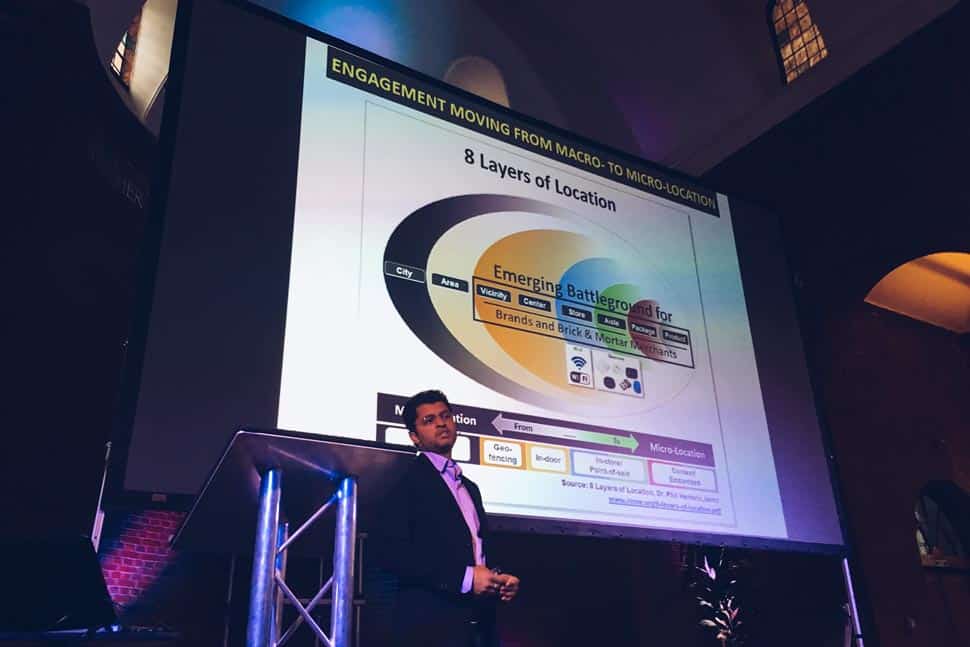Sometimes, you are lucky enough to listen to speakers whose presentations give you such a comprehensive 33,000 foot perspective of a subject, that it’s impossible to sum it all up. You then leave the presentation feeling that you actually broadened your horizons about an issue which someone else has done a lot of thinking about.
Such was the case with Prof. Anindya Ghose, who I recently caught at an event of how to: Academy in London. He spoke about “The Future of the Mobile Economy”, and specifically about trends in mobile advertising and big data analytics.
At his presentation, Prof. Ghose explained some of the opportunities (and risks) he sees for companies that do online advertising, both on mobile devices and desktops.
The talk was geared to promote his new book, “Tap”, which has been out since April.
I figured it’d be most useful if I gave you a small number of specific examples where I found Prof. Ghose’s insights helpful.
Lesson 1: Mobile advertising is currently still under-utilised
Relative to the amount of time consumers spend on using particular media channels, companies spend much more money on print advertising than on mobile advertising.
As Prof. Ghose argues, there is an “opportunity gap” created by mobile media attracting so many eyeballs for so much time but companies not yet spending that much money on pushing advertising towards mobile devices.
Here are the figures for the past 3 years:
| 2014 | 2015 | 2016 | |
| Print media | |||
| Time spent on print media | 4% | 4% | 4% |
| Money spent on print media ads | 18% | 12% | 12% |
| Mobile media | |||
| Time spent on mobile media | 24% | 25% | 28% |
| Money spent on mobile media ads | 8% | 12% | 21% |
| Opportunity gap | $25bn | $22bn | $12bn |
The amount of time that consumers spend on a medium is only one of several indicators of the reach, engagement and effectiveness of an advertising channel. Still, it seems that the gap between advertising spend and the actual consumer attention dedicated to the channel was a result of companies being slow in adapting their advertising spend to a changing world.
As Prof. Ghose argues, there is an “opportunity gap” created by mobile media attracting so many eyeballs for so much time but companies not yet spending that much money on pushing advertising towards mobile devices.
Why haven’t companies fully caught up yet with the opportunities that mobile advertising offers?
A lot of executives look at the wrong metrics (if they look at metrics at all). E.g., many companies mistakenly see mobile advertising as less important because globally, only 4% to 5% of all online purchases are made through mobile devices. What they fail to take into account is the fact that 35% to 40% of all online purchases are influenced by the information (and advertising) consumers have seen on their mobile device.
Conclusion: If your company is spending anything on advertising, you could be well advised to check if you are spending sufficiently on mobile advertising. You might get more bang for the buck as this area remains under-utilised and, therefore, probably underpriced. (Obviously, much of this depends on specific circumstances, e.g. it might be true for some product categories but not for others.)
Lesson 2: Mobile ads will be vastly more effective than other ads
Prof. Ghose believes that mobile advertising will (on the whole) become ever more effective because it’ll be hyper-targeted based on the incredible amount of personal data that smartphones generate (such as about your location). Mobile advertising will out-compete other forms of advertising.
Big companies will spend vast sums of money on finding out how to leverage the mobile ecosystem to create value. Will you be able to keep up with them?
However, unless you are a big company, you’ll never be able to invest sufficient amounts of money into your mobile advertising techniques to compete with those companies that do. Big companies will spend vast sums of money on finding out how to leverage the mobile ecosystem to create value. Will you be able to keep up with them?
Conclusion: Either hire the best people and invest lots of money into making mobile advertising work for you. Or try and find a different niche where the steamrolling success of mobile advertising done by data-rich big companies isn’t going to affect you negatively (i.e., find a real niche).

Lesson 3: Consumers, educate yourself!
As a consumer, you’ll want to educate yourself on an ongoing basis about how to best use mobile devices.
Keep in mind that your smartphone provides companies with data that allows them to create a birds-eye view of what you are interested in. Smartphones collect granular, atomic data about you. What you want to make sure is that advertising is your servant rather than something that stalks and pesters you.
E.g., when you enter a shopping mall, and you log onto their WiFi, you will want to consider giving your consent to all of your relevant smartphone data being made available to define which ads may be of interest to you. If you first go to a Samsung Store and then to an Apple Store (which the GPS system will know – 91% accuracy down to 3 feet distance!), then you’ll be targeted with a mobile ad for the special offer Apple is willing to make to you for the purchase of an iPhone, knowing that you are at risk of making a purchase at Samsung instead. You’ll get a great deal because of your sophisticated shopping behaviour (shopping around AND signalling to competing companies that you are doing so), and Apple, in turn, will pay top Dollars for being able to push this particular advertising your way.
If you do that, you’ll find your smartphone the most useful, valuable digital companion you have ever had.
Or, you’ll want to opt out of the entire system, e.g. by blocking ads. That’s a separate subject altogether (and one for another day).
Conclusion: There is real value – both economically and regarding convenience – in proactively setting up your smartphone in such a way that the most relevant offers can be sent your way by those companies that invested into the mechanisms to target you in the most effective way.
Here is more information if it interests you
I had not previously heard of Prof. Ghose, but will now follow his work to keep up to date with mobile advertising and related subjects.
- Check out his fascinating CV: on Wikipedia or the NYT Stern website.
- He also actively uses Twitter and LinkedIn.
- You can find his new book on Amazon.
- Last but not least, there is an extensive review of his book by a knowledgeable industry observer, Curtis Frye, the editor of Technology and Society Book Reviews.
Just to have mentioned it, I am not getting paid for this review and I paid the regular ticket price to attend the event.
If you enjoyed this, you might also find the following articles useful:
Want to print this article? Open a printer friendly version.
Did you find this article useful and enjoyable? If you want to read my next articles right when they come out, please sign up to my email list.
Share this post:


